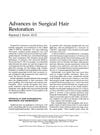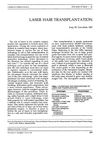Search
forResearch
5 / 1000+ results
research Advances in Surgical Hair Restoration
Surgical hair restoration has improved since 1959, with new techniques like minigrafts, micrografts, and scalp reductions creating more natural hairlines and reducing bald skin, despite some risks and potential for scarring.

research International Society of Hair Restoration Surgery
Various techniques and tools for hair restoration were presented in 1998, including a mathematical model for donor area, use of lasers in surgery, methods for controlling grafted hair direction, and ways to increase graft yield. Satisfaction rates were around 39%, and studies showed trauma and dehydration can damage hair follicles.

research Philosophy and Technique in Hair Restoration Surgery
Hair restoration surgery has evolved over time, with a focus on natural-looking results and managing patient expectations, while also considering potential complications and the lifelong progression of male pattern baldness.

research Advances in Hair Restoration Surgery
Hair restoration surgery has improved with better techniques for natural looks and managing patient expectations, but it remains labor-intensive and requires careful consideration of potential complications.

research Laser Hair Transplantation
Laser hair transplantation can be effective but should be limited to small areas and requires more training to ensure safety and effectiveness.
Community Join
5 / 460 resultscommunity Something not talked about in the hair transplant industry
Hair transplant success largely depends on individual biology, with many patients needing multiple procedures to achieve satisfactory density. Even top surgeons can't guarantee results, and many people use additional treatments like Minoxidil and Finasteride.
community If we can clone a sheep why we can't cure baldness till now
Hair loss treatments like Minoxidil, finasteride, and stem cell therapies exist, but a complete cure is hindered by genetic complexity and market dynamics. Cloning hair follicles is considered a potential solution, but it's currently not feasible.
community Justin Bieber got a hair transplant
Justin Bieber has had multiple hair transplants, with discussions on the cost and quality in places like Turkey. Despite using treatments like finasteride, his hairline appears unnatural to some.
community Young guys 18-25, did hair loss destroy you mentally and affect your life? And if you did recover from it have you truly ever felt the same?
Hair loss greatly affects mental health and social life for young men. Treatments like finasteride, minoxidil, and hair transplants are common, with mixed success and ongoing self-esteem challenges.
community Cbum's hair transplant looks absolutely terrible
A bodybuilder's hair transplant appears unnatural with a straight hairline and low density, possibly worsened by not using finasteride. The Turkish clinic is criticized for poor design, and the transplant may have been free for promotion.